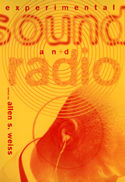 |
 |
 |
 |
 |
![]()
Volume 5,
Issue 3, Spring 2002
|
Experimental Sound and Audio Weiss, Allen, Ed.MIT Press, 2000 188 pages Paper: $19.95 US |

|
Reviewed by: Craig
Stark, Sam Houston State University
Printer-friendly PDF
version
I must admit that when I first agreed to review Experimental Sound and Audio, I thought I would be evaluating a production-oriented text. Having taught audio and video production exclusively over the past seven years, that’s just the perspective I have these days. At first, I was rather disappointed when I received the book and found that it contains 22 writings (essays and poems) that describe audio and sound in an esoteric and aesthetic sense. However, after reading the text, I realized that this is a great collection that provides the reader with a look at sound from dramatically different perspectives.
I have always been a "fan" of audio, sound, and radio. I probably fall into the category of people who became fans when they were growing up--for my seventh birthday, I got a cassette tape recorder and spent hours recording sounds, character voices, and anything else I could find, much to the chagrin of my family. After reading this text, I believe that every one of the included authors also is a "fan" of audio, sound and radio, and probably had similar experiences. Maybe I have spent too much time on the technical side of audio production, but I can tell you that many of the descriptions and uses of sound and audio in this text brought a chill to my spine. One of those times was at the very beginning when Weiss describes Pantagruel’s experiences with frozen sounds that have thawed. One can only imagine such a terrible, yet exhilarating experience.
Not to take anything away from any of the other writers, but two of the most intriguing essays are by Mark Roberts and G.X. Jupitter-Larsen. Roberts’ essay, "Wired: Schreber as Machine, Technophobe and Virtualist," describes the life of Daniel Paul Schreber, a rather interesting chap from the 19th and early 20th century who claimed to receive "rays" that carried vocal messages into his body. What makes it really interesting is how Schreber described his experiences in his journal, making references to terms and characteristics of audio that were not familiar at the time. According to Roberts, Schreber even described the basic concept of carrier waves when such knowledge was not common (33). Much like Pantagruel’s experience, it is an exhilarating read.
Jupitter-Larsen is a performance artist and "noisician" who has a job I sometimes wish I had. His brief essay describes how he creates his art of making noise on various radio stations around the country. Jupitter-Larsen argues that there is a distinct art to noise and that most, if not all, noises are unique. I tend to agree. Examples of noise made by Jupitter-Larsen include breaking glass, setting large trucks on fire and even using an ion-gun to charge an audience to 5,000 volts (175). His latest experiments with noise include a microphone and a power grinder. I know I have felt like doing that at times, but not for any artistic purposes. Nevertheless, Jupitter-Larsen seems to be a truly interesting character and it was a joy to read his essay.
I have tried to impress upon my students that the nature of sound itself is an incredibly important thing to learn. Sometimes however, I feel my words fall upon deaf ears (no pun intended). While this book may not be appropriate for a basic audio production course, it provides an excellent perspective of analyzing and evaluating sound and at the very least could be used as a recommended text. The book could have other applications as well, including general communication courses or performance art courses. The book also has an optional CD titled Voice Tears that has several works by sound artists, to help enhance the reading material.
Experimental Sound and Radio is an excellent collection of essays that cause the reader to truly notice the beauty and uniqueness of sound and what it can offer. Too many times we are either unaware of the complexity of sounds around us, or we just take them for granted. Weiss’ collection of essays will truly open the ears (and eyes) of the people who read them.
Back to Top
Home | Current
Issue | Archives
| Editorial Information
| Search | Interact